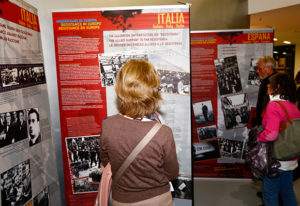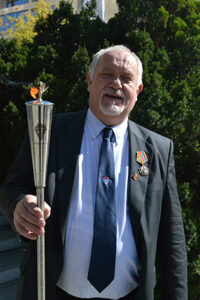31. Mai 2019
On the one hand, the result of the elections to the European Parliament confirmed the concerns of the anti-fascists and democrats, but on the other hand it also underlined the different political balances of power in the respective countries.
Some characteristic features can be seen in all the results:
- Voter turnout rose in almost all European countries. This is not the result of a “European euphoria”, but shows the concern of many people in the different countries that a low turnout could lead to an increased number of deputies from the extreme right, nationalist and right-wing populist parties. In addition, indeed, in some countries where voter turnout was high, extreme right-wing parties have significantly underperformed their expectations.
- The previous majority parties of the European People’s Party (EPP) or the Group of European Socialist and Democrat Parties (PSE) have lost about 25% of their seats. This makes it clear once again that many people in the countries of the European Union are dissatisfied with the policy and development of this European policy.
In the appeal of the FIR and other European anti-fascists, we formulated our criteria for a different Europe. We do not want a Europe of the companies and banks, but of the citizens and the socially weak ones. From the past majority parties humans expect obviously no solution of the pressing political problems. The political left has also suffered losses, particularly the defeat of the SYRIZA party and losses in France and Germany.
- Environmental policy issues have taken on great importance in various EU countries. Young people are committed to “Friday for Future” and other issues. The parties of the ecology movement were therefore able to increase their share of the vote in many countries. It remains to be seen whether these voices can also be effective for a consistently anti-racist and peace policy.
4. It is noticeable that regional parties or niche parties, which stand up for individual interests of groups of people, are represented in larger numbers in the European Parliament. It is not yet clear which positions they will adopt on more far-reaching issues such as the militarization of Europe, the tightening of the border regime (FRONTEX) or the neoliberal economic course. They should, however, be the contact points for political initiatives at European level.
5. In the run-up to the elections, there were many speculations that extreme right-wing and right-wing populist parties could rise to become the largest political group in the European Parliament. Fortunately, these right-wing “flights of fancy” suffered a political belly landing. Although the proportion of votes cast by the Italian Lega grew to over 30%, which meant doubling its votes, the European Parliament was unable to keep up with the rise in the number of votes. The French RN (formerly FN) of Marine LePen became the strongest party in France, even though it lagged significantly behind the results of the parliamentary elections. The German AfD also increased its vote to 11%. But it also fell well short of its result in the German Bundestag elections. The FPÖ, which took office as the ruling party, lost much of its influence in the scandal surrounding its frontman HC Strache. In other countries (Netherlands – Wilders, Denmark – Danske Volkeparti, Finland – the true Finns) they also lagged behind their earlier results. Together with other right-wing parties, they gained roughly the same number of mandates that the EPP had lost.
Overall, it can be said that this election campaign saw the first broad international social mobilization – not for a party, but against the advance of the European right. The claim to power of LePen (RN), Salvini (Lega), Strache (FPÖ), Wilders (PVV), Meuthen (AfD) and other leaders of European right-wing parties, which they have raised several times in recent months, has mobilized many people against these dangers and led to a much worse result for the right-wing parties than they had hoped for.
When the black-blue government came to power in Vienna, there were the largest demonstrations and rallies in recent years with 60,000 and 80,000 participants respectively.
In France, the political left and the trade union movement not only mobilized against the advance of Le Pen, but also combined their protests with active resistance against the Macron government’s planned cuts in the socio-political system. In addition, the “Yellow West Movement” created a social resistance that shook the political system in France.
While the right in Milan mobilized about 15,000 participants at their “big rally”, several 10,000 people demonstrated “for the anti-fascist values of the constitution and freedom against all forms of fascism” in this city on the Constitution Day on April 25, 2019.
In Germany, the mass demonstration “# indivisible” with almost a quarter of a million participants in Berlin in autumn 2018 and 150,000 demonstrators on the weekend before the European elections at six rallies against nationalism and for a social Europe showed that especially young people were ready to stand up for another, an anti-fascist Europe.
In the middle of March, anti-racist initiatives with demonstrations, rallies and other creative forms of action had made it clear that they were defending themselves against the refugee policy of the rulers in Europe and that they were advocating humane and solidarity-based help.
One should also not forget that the FIR and the anti-fascist federations in the respective member countries brought themselves with public declarations and other actions clearly in this election campaign to hearing. The common declarations were presented in different countries and communicated by the media. The declarations were often used to spread also own appeals and calls in the different countries. Here it showed up once more that the member federations of the FIR and the forces connected with them are actually able to intervene effectively in the political and social debates and fights.
That there was no march through of the extreme right, the fascists, nationalists and right-wing populists in Europe it is also a merit of the international anti-fascist movement. However, we must not rest on our laurels. We must continue to work on the networking of anti-fascist associations and anti-racist initiatives. Globalization-critical organizations and the peace movements in the different countries must also be included in it. And as an important social partner, the connection to the trade unions must also be strengthened. The positive experiences of the political initiatives of the past weeks show that such social alliances are possible. It should be a common goal of all anti-fascists to develop further for the “construction of a broad democratic and front of the people” (anti-fascist appeal to the European elections).
We will not let the extreme right in Europe get through!


